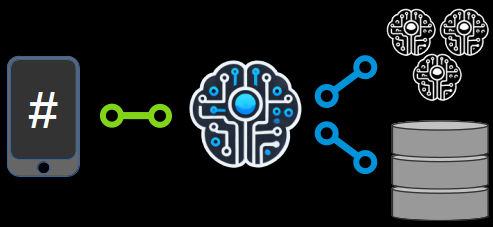AI Data Sovereignty
Today we use Retrieval Augmented Generation as an intermediary between the User and the information they are looking for. This design works great for AI as a Service offerings like OpenAI, Grok, Deepseek, etc. These companies benefit from your interactions as well as the AI’s responses to tune the AI to be more effective for future questions of a similar type. Much like Google caches search requests to help speed up the response for the next similar request, the AI can be trained to answer questions more effectively when it has domain specific knowledge.
- Medical
- Financial
- Industrial
- Science
Every domain of knowledge is currently being innovated with AI augmented knowledge management systems to to help bridge a skills gap between entry level employees and their seasoned professionals who may be looking to retire soon.
How many businesses are running today who have “the button” that should never be pushed but nobody remembers why.
Sharing the knowledge
How do you feel about sharing medical, banking and other sensitive information with an AI?
What if that AI is yours, tuned and trained on your information, emails, text, medical history, banking, investments, friends, family. Before you say “frightening”, just know that Meta (Facebook), Microsoft and Google have built artificial “personas” based on real world information. Instead of it helping you live a more fulfilling life or spend your money and time more wisely it’s used to target you and others in your sphere of influence to buy things.
Your data should benefit YOU.
Businesses continue to invest in AI intermediaries to the point that all your customer interactions with the company is brokered by an AI.
Why not have that interaction brokered by your own AI.
Do no harm - The Three Laws
When Asimov conceived the Three Laws of Robotics in 1942, he knew that humans would eventually build autonomous reasoning machines that such laws would be necessary.
# 1 - An AI may not injure a human being or, through inaction, allow a human being to come to harm.
# 2 - An AI must obey the orders given it by human beings except where such orders would conflict with the First Law.
# 3 - An AI must protect its own existence as long as such protection does not conflict with the First or Second Law.
Harm can come in the form of poor life choices. If I’m being lazy and want a burger instead of making myself a salad this can cause harm. Not immediately but it certainly wouldn’t be in my best interest if I knew my LDL was high in my last blood test and going for the burger and shake combo would certainly make that worse.
What if our AI could look out for us by making sure that our pantry is stocked with healthy choices. So at 7PM on a Tuesday night I start a search for “Burgers near me” my AI might remind me that I have all the ingredients to make a delicious chickpea salad. Or if I’m insisting on being lazy here are some vegan restaurants nearby that offer delivery with recommended dishes from each for me to choose.
